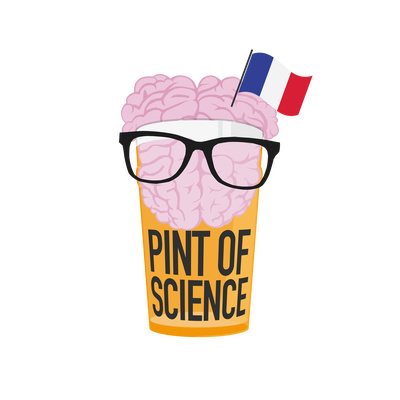
An international festival

The Pint of Science festival takes place in 27 countries around the world and in more than 50 cities in France. Discover the full program near you.
From Monday, 19 to Wednesday 21 May, from 7 to 10 pm, we invite you to join us at the bar:
"Le dernier bar avant la fin du monde"
19 avenue Victoire
75001 Paris
Program
Monday, May 19 - Brains, tumors and futuristic chips
From organoids on a chip that are revolutionizing medicine without animal testing, to brain tumors that mutate and come back stronger, join us for an evening of science exploring tomorrow's technologies and the mysteries of the brain.
Organoids, a little chip
Hugo Salmon - Senior Lecturer. Université Paris Cité
In 2023, the first therapy without animal testing will enter the clinical phase thanks to the use of organoids on chips. Although it is too early to say that this breakthrough will provide a permanent solution to reduce the impact on animals used for scientific purposes and to advance biomedical research, these miniaturizations are revolutionizing our methods of drug evaluation. More precise and ethical, these technologies hold great potential for the development of biotherapies. On May 19th, Hugo will show you how!
Brain cancer: a space odyssey
Lucie Gaspard-Boulinc - Doctoral student. Institut Curie
Brain tumors are rare but frightening. Some respond well to treatment but can come back in a more aggressive form. This phenomenon remains poorly understood, but the cellular environment of tumors may play a key role. Like explorers mapping an unknown planet, Lucie is using cutting-edge technologies to analyze where and how cells interact. Her goal? To decode these invisible mechanisms and pave the way for new treatments. Ready for a journey to the heart of the brain and the secrets of cancer?
Tuesday, May 20 - Kidneys, cells and deadly secrets
What happens when our kidneys burst under pressure? Why do certain parts of our body die before we're even born? An evening where science rhymes with suspense, between the mechanics of the kidney and the morbid mysteries of human development.
The kidney under pressure: how the flow of urine affects our cells.
Aurore Claude-Taupin. Inserm researcher. Institut Necker
Every day, our kidneys filter almost 50 liters of blood, a colossal task subject to invisible forces. Among them, the flow of urine exerts shear forces on the renal cells, affecting their function and health. But what happens when this balance is disrupted? Using an in vitro model, Aurore explores how these mechanical forces play a key role in the progression of chronic kidney disease, which affects nearly 10% of the world's population. Dive with her into the heart of the cellular mechanics of the kidney!
In search of lost organs
Augustin Chen - Doctoral student. ICM (Institut du Cerveau et de la Moelle épinière)
Death is fascinating. Even more so when we realize that parts of our bodies die before we are even born. Our bodies are made up of cells that form our organisms at the beginning of our lives. But how? One might think that nature is well designed, that each cell has a precise task and that they form the body in a harmonious dance. But in reality, researchers have observed that they act randomly, don't listen to each other, fight and even kill each other. From degenerated human tails to fallen nipples, welcome to the graveyard of forgotten organs!
Wednesday, May 21 - Body mysteries: stealth viruses and hairy cells!
HIV evading treatment, cells growing eyelashes... the human body is full of secrets! Immerse yourself in the challenges of AIDS and discover the surprising cells that circulate vital fluids. Science and curiosity meet to explore the invisible!
HIV: the elusive adversary
Marie Woottum - PhD, Institut Cochin
What if HIV doesn't play by our rules? By merging directly with immune cells, it avoids certain stages of replication and evades antiviral drugs. A true evasion strategy that complicates the fight against infection.
Hairy cells in your body?!
Michella Khoury Damaa - Post-doctoral student. École Normale Supérieure
When we think of a cell, we immediately imagine something small and round. But the cells in our body come in a variety of shapes, depending on the organ they make up. Some have a real bush on their head! These are the multicellular cells with their beating cilia that allow them to circulate different fluids throughout the body. But how do they manage to grow cilia as our body develops? Come and unravel the mysteries of these hairy cells and understand how they are made.
